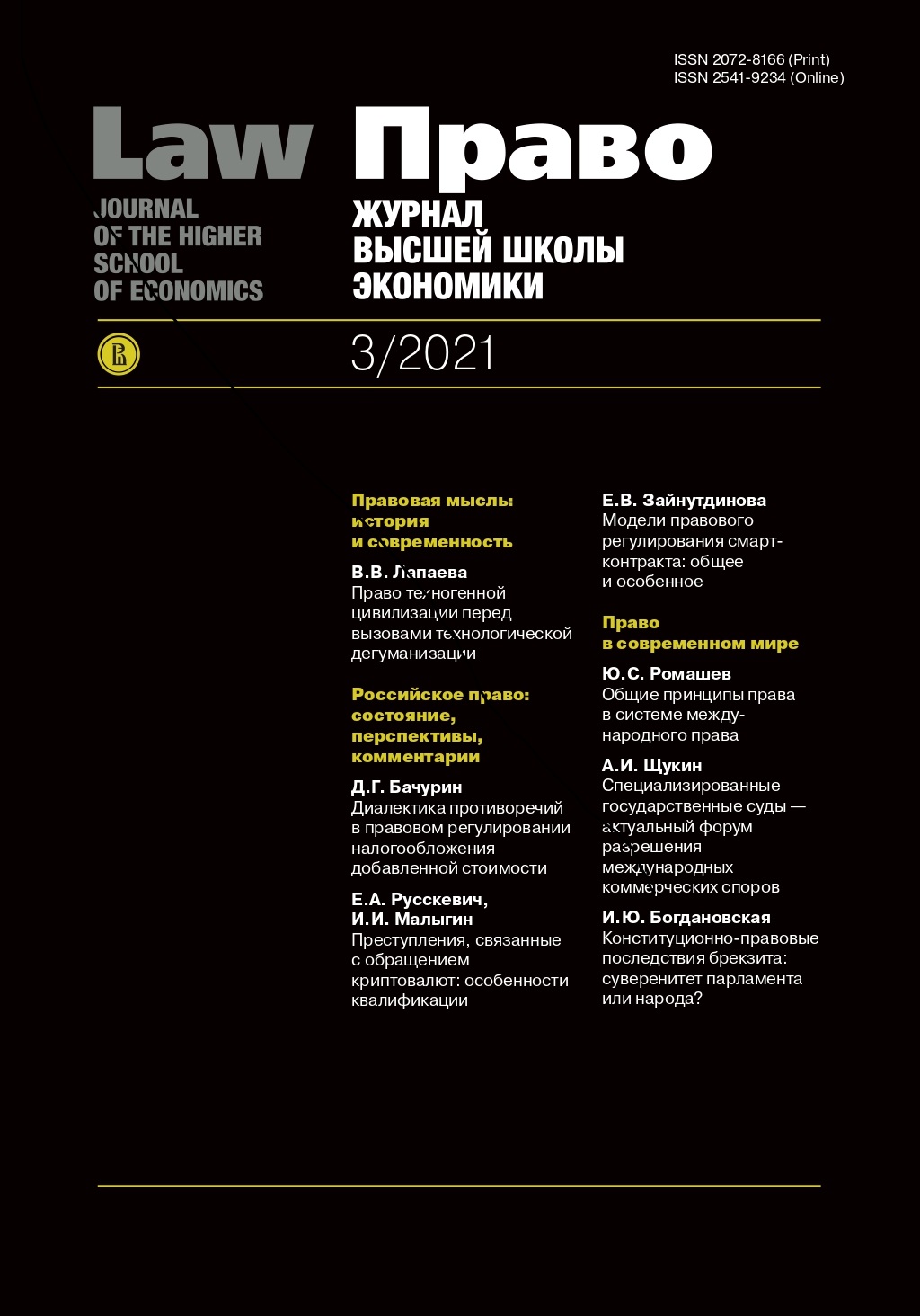Authentic (Author’s) Interpretation: Theoretical-Legal and Constitutional Legal Aspects
Abstract
The aim of the research is to study the legal nature of authentic interpretation, its content and meaning as an independent type of interpretation of law, as well as to establish the set of subjects of such interpretation. The methodological basis of the research is formed by General scientific methods: dialectical, logical, system-structural, comparative, etc.; as well as private scientific methods: historical-legal, formal-legal, comparative-legal. It is noted that the term «authentic interpretation» was given diverse meanings at different stages of the development of Russian legal science. In the 19-early 20th century, authentic interpretation was identified with law-making. In Soviet legal science, an authentic interpretation was considered to come from both the subject of law-making and other authorized bodies. Modern research focuses on the government Agency that interprets the norm. It is proposed to replace the term «authentic» with the term «author's», since this name more accurately characterizes this type of interpretation. The article shows the main approaches to understanding authentic (author's) interpretation in Russian and foreign jurisprudence. It is established that when determining the range of subjects of the author's interpretation, it is necessary to consider the presence or absence of legal formalization of the power to interpret the norm. If we assume that the right to create and formalize norms automatically generates the right to interpret them, then the subject of authentic (author's) interpretation can be any state or non-state body that is the subject of law-making. If we assume that the author's authority to interpret their acts and its implementation should be regulated by the law, the range of subjects of author's (authentic) interpretation will be sharply narrowed. In addition, the research examines the relationship between the range of subjects of authentic (author's) interpretation and the form (source) of law in which the author puts the norm. Several controversial problems are identified: the subject of author's interpretation when creating an act in the order of delegation, and people's law-making, judicial author's interpretation, the author's interpretation of religious texts and normative agreements. The relationship between the subject and the object of authentic (author's) interpretation is demonstrated.
References
Berner K. (2016) Authentic Interpretation in Public International Law. Zeitschrift für ausländisches öffentliches Recht und Völkerrecht, no 4, pp. 845-878.
Cherdantsev A.F. (1979) Interpreting Soviet law. Moscow: Yuridicheskaya literatura, 168 p. (in Russian)
Chevallier J. (2002) Doctrine juridique er science juridique. Droit et societe, no 50, pp. 103-119.
Dworkin R. (1986) Law's empire. Cambridge: Harvard University Press, 470 p.
Fatkullin F.N. (1987) Issues of the theory of state and law. Kazan': University, 336 p. (in Russian)
Gulyaev A.M. (1912) Russian civil law. Saint Petersburg: M.M. Stasyulevich, 500 p. (in Russian)
Dernburg G. (1906) Pandekty: Common part. Vol. 1, Moscow: MSU, 481 p. (in Russian)
Evintov V.I. (1979) Multilanguage treaties in the modern international law. Candidate of Juridical Sciences Thesis. Kiev, 199 p. (in Russian)
Kazanskiy P.E. (1913) Power of Russian emperor. Odessa: Tekhnik, 1000 p. (in Russian)
Kolokolov Y.N. (2011) Authentic formal interpretation of legal acts. Candidate of Juridical Sciences Summary. Nizhniy Novgorod, 36 p. (in Russian)
Korkunov N.M. (1886) Lectures on common theory of law. Saint Petersburg: Martynov, 364 p. (in Russian)
Lazarev V.V. (1972) Applying Soviet law. Kazan': University, 200 p. (in Russian)
Nedbaylo P.E. (1960) Applying Soviet legal norms. Moscow: Gosyurizdat, 511 p. (in Russian)
Nersesyants V.S. (2000) General theory of law. Moscow: Norma, 552 p. (in Russian)
Oppengeym L. (1949) International law. Moscow: Inostrannaya literatura, 547 p. (in Russian)
Pereterskiy I.S. (1959) Interpreting international treaties. Moscow: Gosyurizdat, 172 p. (in Russian)
Petrushev V.A. (2006) Authentic interpretation of law. Vestnik Rossiyskoy pravovoy akademii, no 2, pp. 14-18 (in Russian)
Pigolkin A.S. (1962) Interpreting normative acts in the USSR. Moscow: Gosyurizdat, 166 p. (in Russian)
Smirnov A.V., Manukyan A.G. (2008) Interpreting legal norms. Moscow: Prospekt, 144 p. (in Russian)
Spasov B.P. (1986) Law and its interpretation. Moscow: Yuridicheskaya literatura, 248 p. (in Russian)
Spasov B.P. (1983) Zakonodatelstvo i t'lkunave na zakonite. Sofiya, 345 p.
Trubeckoy E.N. (1917) Encyclopedia of law. Moscow: Mamontov, 227 p. (in Russian)
Shamsiev H.R. (1998) Exterritorial application of currency control. Candidate of Juridical Sciences Thesis. Moscow, 176 p. (in Russian)
Shershenevich G.F. (1910) General theory of law. Moscow: Bashmakov, 805 p. (in Russian)
Svensson R. (1982) Konkretisierung von Rechtsnormen. Berlin: Academy, 72 p.
Vasilevich G.A. (2017) The interpretation of legal acts. Pravoprimenenie, vol. 1, no 1, pp. 19-27 (in Russian)
Vas'kovskiy E.V. (1901) Interpreting and applying civil laws. Odessa: Ekon tip., 400 p. (in Russian)
Wroblewski J. (2015) Selected writings. Warszawa: Wolters Kluwer, 480 p. (in Polish)
Copyright (c) 2021 Law Journal of the Higher School of Economics

This work is licensed under a Creative Commons Attribution-ShareAlike 4.0 International License.


















